The Sugar Act Of 1764 Facts & Worksheets
The Sugar Act of 1764, also known as the American Revenue Act, was passed by the British Parliament on April 5, 1764, to combat molasses smuggling in the American colonies and earn revenue to fund the colonies’ defense.
Search for Worksheets
Worksheets / Social Studies / Acts, Constitutions & Bills / The Sugar Act Of 1764 Facts & Worksheets

Download the The Sugar Act Of 1764 Facts & Worksheets
Click the button below to get instant access to these worksheets for use in the classroom or at a home.
Download This Worksheet
This download is exclusively for KidsKonnect Premium members!
To download this worksheet, click the button below to signup (it only takes a minute) and you'll be brought right back to this page to start the download!
Edit This Worksheet
Editing resources is available exclusively for KidsKonnect Premium members.
To edit this worksheet, click the button below to signup (it only takes a minute) and you'll be brought right back to this page to start editing!
This worksheet can be edited by Premium members using the free Google Slides online software. Click the Edit button above to get started.
Not ready to purchase a subscription? Click to download the free sample version Download sample
Download This Sample
This sample is exclusively for KidsKonnect members!
To download this worksheet, click the button below to signup for free (it only takes a minute) and you'll be brought right back to this page to start the download!
Table of Contents
The Sugar Act of 1764, also known as the American Revenue Act, was passed by the British Parliament on April 5, 1764, to combat molasses smuggling in the American colonies and earn revenue to fund the colonies’ defense. The measure was unpopular and contributed to the American Revolution from 1765 to 1789.
See the fact file below for more information about the Sugar Act of 1764 or you can download our 24-page Sugar Act of 1764 worksheet pack to utilize within the classroom or home environment.
Key Facts & Information
HISTORICAL BACKGROUND
- The history of the Sugar Act begins with the Mercantile System, founded on the economic idea of Mercantilism, which emphasizes selling goods to create wealth. To generate more income, a country must export more things than it imports – and sell more than it purchases.
- If it succeeds, the country will have a positive trade balance. A nation must enact government laws that defend its interests to sustain a positive trade balance in the Mercantile System. On the other hand, protectionism is the system in which the country needs to safeguard or control all elements of its economy.
- The colonies existed for two reasons in the eyes of Britain:

- From 1651 to 1765, England imposed rules on producing raw materials and goods, shipping methods, and maritime routes.
- The regulations were designed to benefit Britain at the expense of its colonies, allowing Britain to maintain a favorable trade balance against them, as it did against other European countries.
- These rules are known locally as the Acts of Trade and Navigation.
- For the American colonies, the Navigation Acts intended to force merchants to conform to shipping restrictions.
- In contrast, the Trade Acts intended to limit production, forcing colonists to buy products from British merchants.
The Molasses Act of 1733
- The Molasses Act was established to limit commerce by making British goods less expensive than those from the French West Indies. The Act had a profound impact on the importation of colonial molasses commerce.
- Merchants bought raw sugar (typically in the liquid form, molasses) from Caribbean plantations and carried it to New England and Europe, where it was sold to rum distillery enterprises.
- Merchant capitalists utilized income from the sale of sugar in New England to buy rum, furs, and lumber, which their sailors carried to Europe.
- Merchants used the earnings from European sales to buy European manufactured goods, such as tools and weaponry.
- On the following leg, they sent those manufactured goods, together with American sugar and rum, to West Africa, where they bartered the products for enslaved people acquired by local rulers.
- The enslaved people were subsequently taken to the Caribbean and sold to sugar plantation owners by the crews. The proceeds from slave sales in Brazil, the Caribbean islands, and the American South were used to purchase more raw materials, thereby continuing the cycle.
PURPOSE OF THE SUGAR ACT
- Parliament passed the Sugar Act on April 5, 1764, and it arrived in the colonies during economic hardship. A large part of the explanation was that during the Seven Years’ War, a considerable amount of the colonial economy had invested in supplying food and supplies to the British Army.
- The Seven Years’ War (1756-1763) was a global conflict waged mainly in Europe, the Americas, and Asia-Pacific, including most of the European great powers.
- Colonials, on the other hand, especially those immediately impacted, like merchants and shippers, felt that the very apparent new tax program was the main culprit. As the protests against the Sugar Act grew, the colonists’ main concern was the economic damage rather than the constitutional issue of taxation without representation.
- The Sugar Act caused significant economic losses at New England ports, as increased enforcement made molasses smuggling more difficult and risky.
- They also claimed that the profit margin on rum was too modest to justify a molasses tax. Many colonists feared being priced out of the market after being forced to raise their rates.
- In contrast, the British West Indies suddenly had unfettered exports. With molasses supply much exceeding demand, the islands prospered with lower expenses, but New England ports saw revenue from rum exports decline.
- Furthermore, the West Indies had been the principal colonial source of hard currency, or specie, and when specie reserves were reduced, the soundness of colonial currency was jeopardized.
- In August 1764, fifty Boston merchants decided to stop purchasing British luxury imports, and there were initiatives in both Boston and New York City to expand colonial production.
- Sporadic outbursts of violence occurred, most notably in Rhode Island. Overall, there was little immediate opposition to the Sugar Act in New England or the rest of the colonies. That would begin later that year with the passage of the Stamp Act of 1765.
- The Sugar Act of 1764 was repealed in 1766 and replaced by the Revenue Act of 1766, which decreased the tax on molasses imports, British or foreign, to one penny per gallon. This happened around the time the Stamp Act of 1765 was repealed.
Provisions of the Sugar Act of 1764:
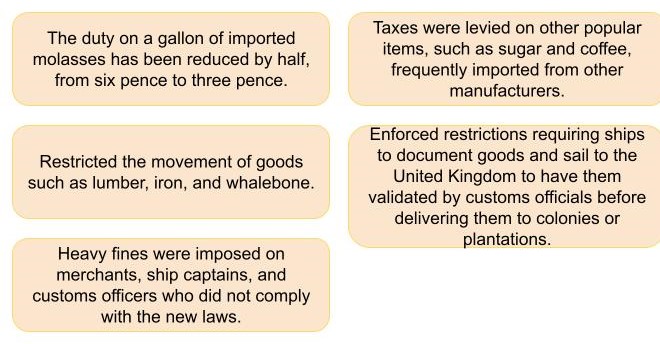

EFFECTS OF THE SUGAR ACT
- The Sugar Act was a watershed moment in British policy because it was the first time a tax was imposed solely to raise funds for the government. It was also a step toward British imperialism because Britain began to regard colonial America as a rival nation.
- Acts imposed by Parliament dealing with the colonies before the Sugar Act were primarily to regulate trade or restrict manufacturing in Colonial America. However, the Sugar Act’s text made it plain that the Act’s objective was to restrict trade and increase income.
- Following the French and Indian War, the American colonies experienced an economic crisis, which the Sugar Act exacerbated.
- Throughout the battle, there was a constant demand for supplies like food and clothing for the troops fighting the French. Without the war, orders dwindled, which had a significant impact on the colonies. Farmers were hit the most since their harvests were no longer required by commissaries, which had to feed hundreds or thousands of men.
- The Sugar Act’s enforcement jeopardized business owners’ rights to conduct business as they saw fit, exacerbating the economic downturn. It pushed many colonial merchants to adjust their business practices because it limited their access to markets, raised their expenses, and lowered their profits during difficult economic times.
BENEFITS OF THE SUGAR ACT
- The Sugar Act benefited British customs personnel, judges, and the British Treasury. Understanding who Parliament expected to benefit from the Sugar Act and who really profited is critical. Because it adhered to the mercantilism concept, Parliament believed it would benefit the Treasury, the American colonies, and plantations in the British West Indies.
- Parliament expected molasses merchants to benefit since the tax was slashed in half, from six pence per gallon to one penny per gallon. The levy was still too high and nearly ruined the New England rum distillation industry.
SUGAR ACT AND THE TRIANGULAR TRADE
- Sugar was one of the items traded between the American colonies, Great Britain, West Africa, and the West Indies as part of the Triangular Trade. The Sugar Act made it difficult for colonial merchants to conduct business with foreign merchants by imposing high taxes on imported goods.
- Triangular trade refers to the routes on the Atlantic Ocean that colonial vessels used to conduct commerce and trade with the United Kingdom, Europe, the West Indies, and Africa.
- Captive Africans would be carried across the Atlantic Ocean’s Middle Passage to the West Indies, where they would work on sugar plantations. Molasses were produced on the plantations and shipped to the New England colonies.
Sugar Act of 1764 Worksheets
This fantastic bundle includes everything you need to know about the Sugar Act of 1764 across 24 in-depth pages. These ready-to-use worksheets are perfect for teaching kids about the Sugar Act of 1764. The Sugar Act of 1764, also known as the American Revenue Act, was passed by the British Parliament on April 5, 1764, to combat molasses smuggling in the American colonies and earn revenue to fund the colonies’ defense.
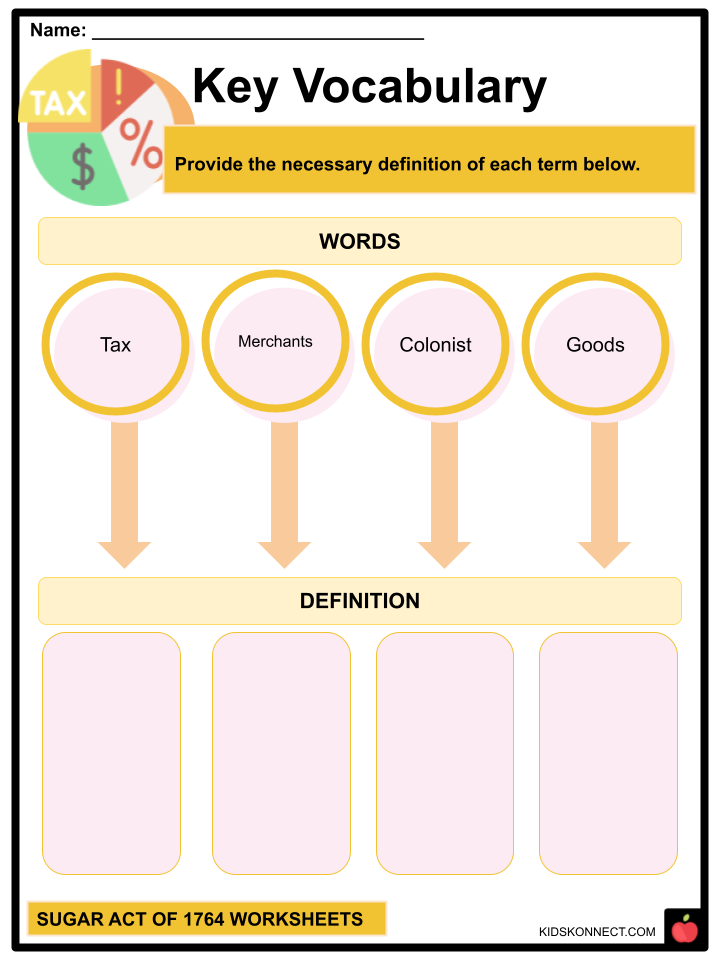
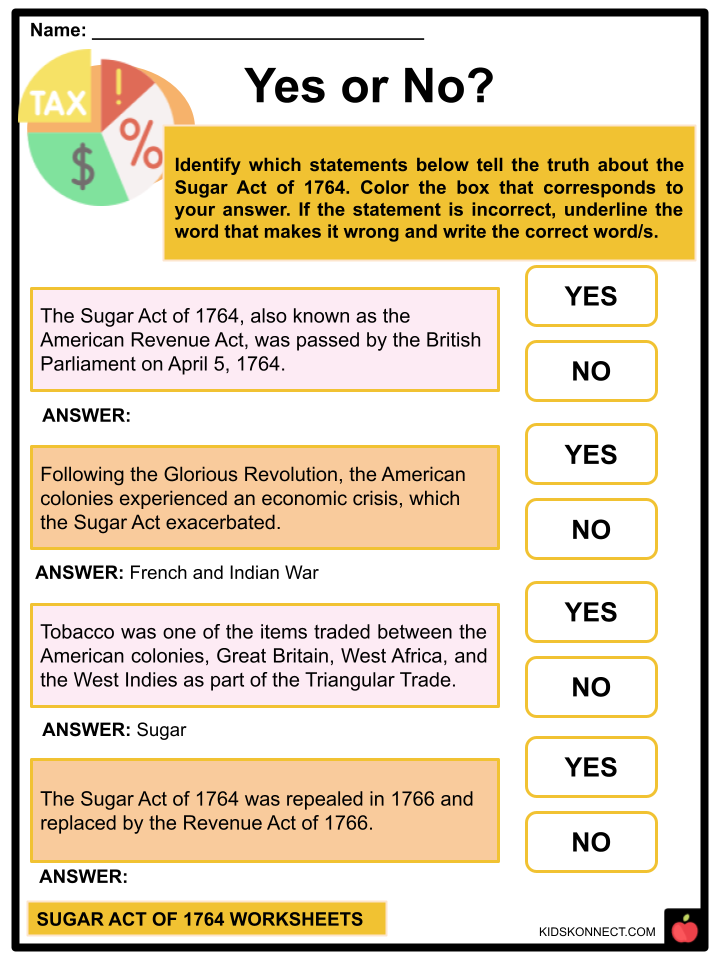
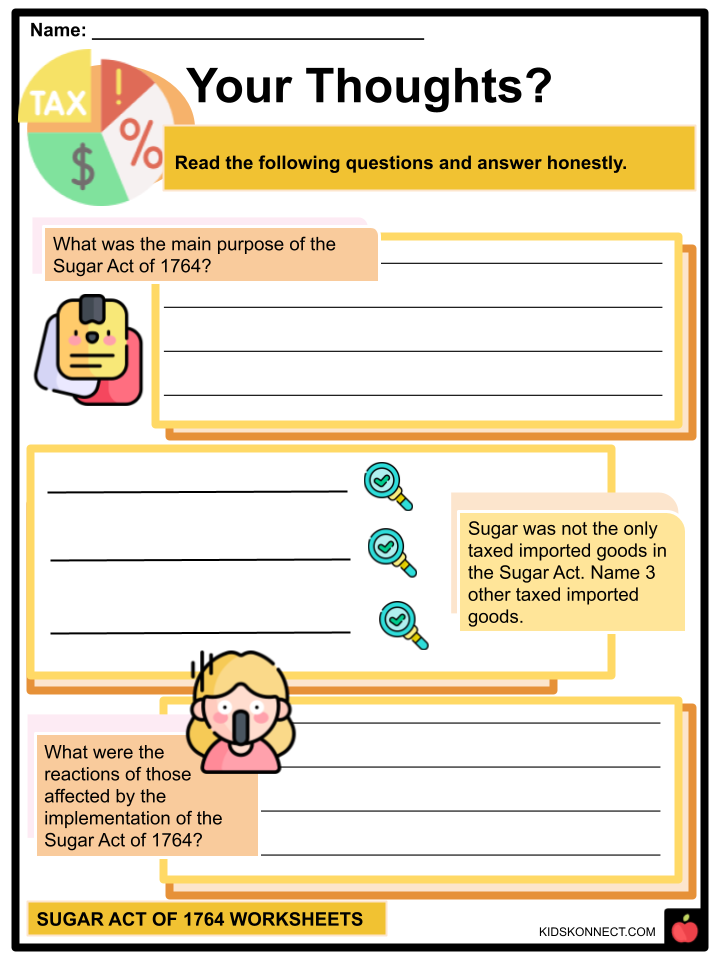
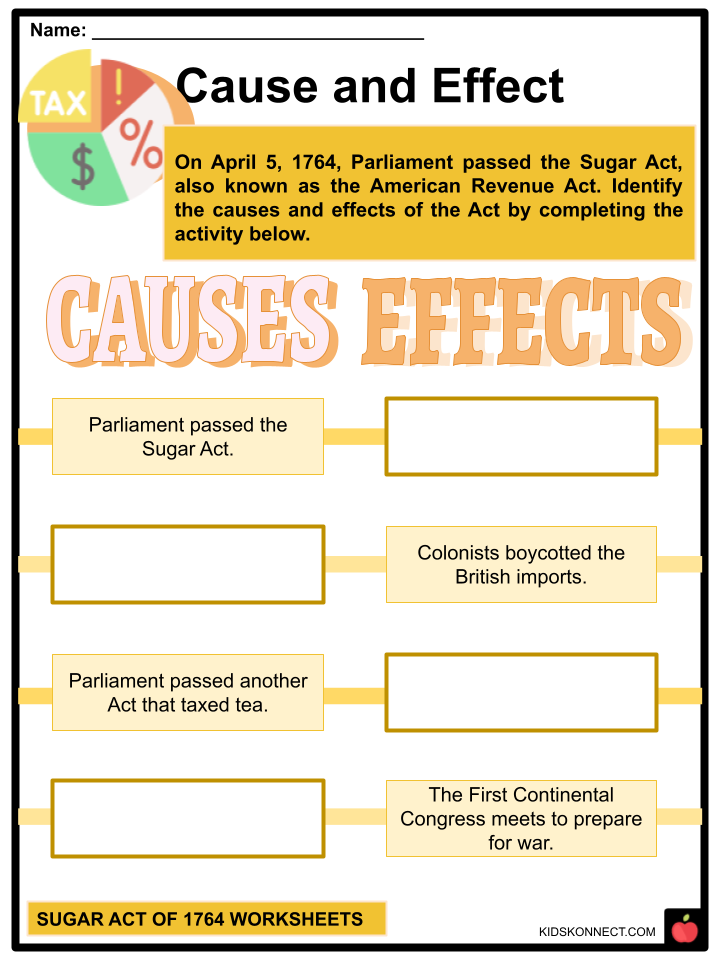
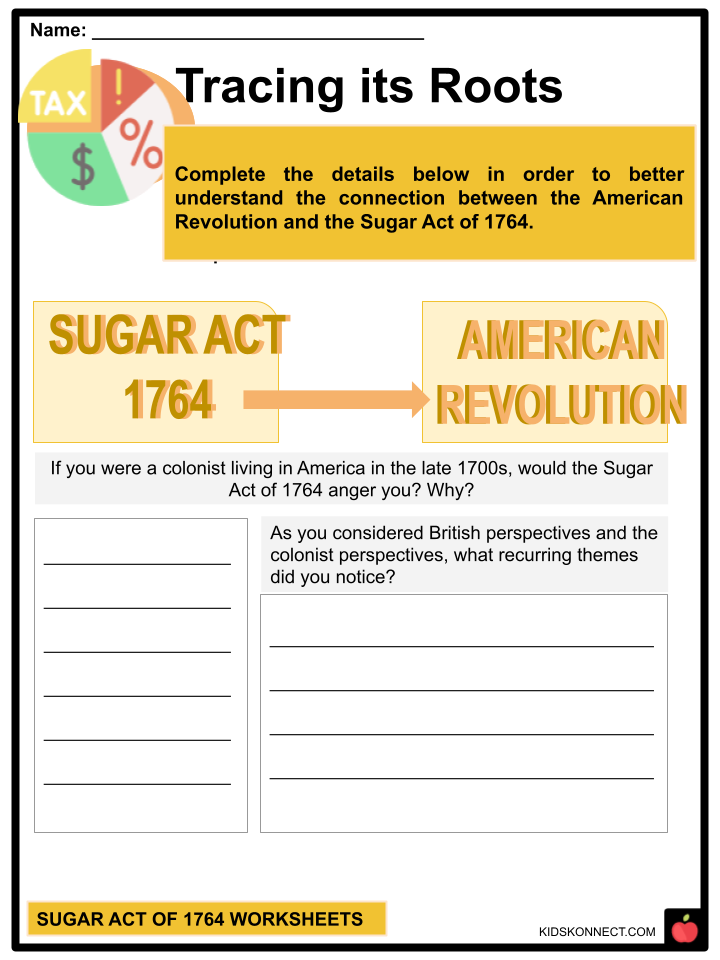
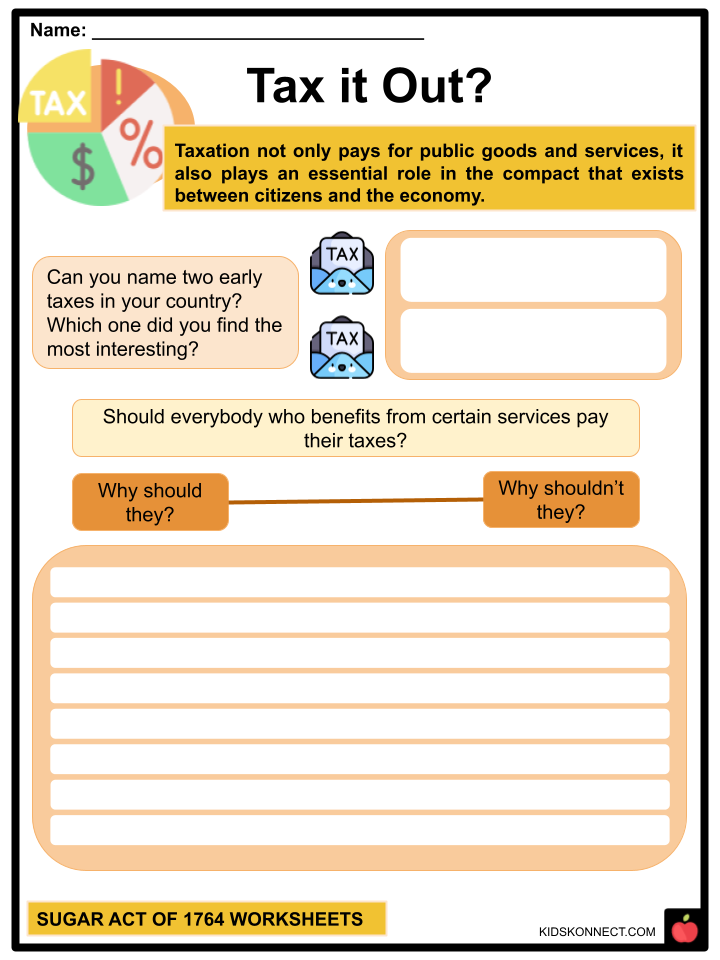
Below is a list of all the worksheets included in this document.
- Sugar Act of 1764 Facts
- Key Vocabulary
- Yes or No?
- Storyboard
- Your Thoughts?
- Cause and Effect
- Tracing its Roots
- What If?
- Is it Fair?
- Tax It Out?
- Protest Poster
Frequently Asked Questions
What was the purpose of the Sugar Act of 1764?
The Sugar Act, also known as the Revenue Act, was enacted by the British Parliament to increase revenue from the American colonies by imposing duties on sugar and other goods imported into the colonies.
What were the key provisions of the Sugar Act?
The Sugar Act aimed to regulate trade in the American colonies by lowering the existing tax on molasses (a crucial ingredient in rum production) while increasing enforcement and penalties for smuggling. Additionally, the act introduced new duties on certain imports, such as wine, silk, coffee, and indigo.
How did the American colonists react to the Sugar Act?
The American colonists strongly opposed the Sugar Act. They viewed it as a violation of their rights to be taxed without representation in the British Parliament. The phrase “No taxation without representation” became a rallying cry against the act and subsequent taxation measures.
What role did the Sugar Act play in the lead-up to the American Revolution?
The Sugar Act contributed to the growing tensions between the American colonies and the British government. The colonists’ resistance to the act set a precedent for their opposition to other taxation measures, eventually leading to the broader resistance that culminated in the American Revolution.
How did the British government respond to the colonists’ protests against the Sugar Act?
In response to the protests and boycotts by the colonists, the British government modified some aspects of the Sugar Act in 1766 with the passage of the Revenue Act of 1766. While it reduced some duties, it reinforced the idea that Parliament had the authority to tax the colonies, further fueling colonial discontent.
Link/cite this page
If you reference any of the content on this page on your own website, please use the code below to cite this page as the original source.
Use With Any Curriculum
These worksheets have been specifically designed for use with any international curriculum. You can use these worksheets as-is, or edit them using Google Slides to make them more specific to your own student ability levels and curriculum standards.











